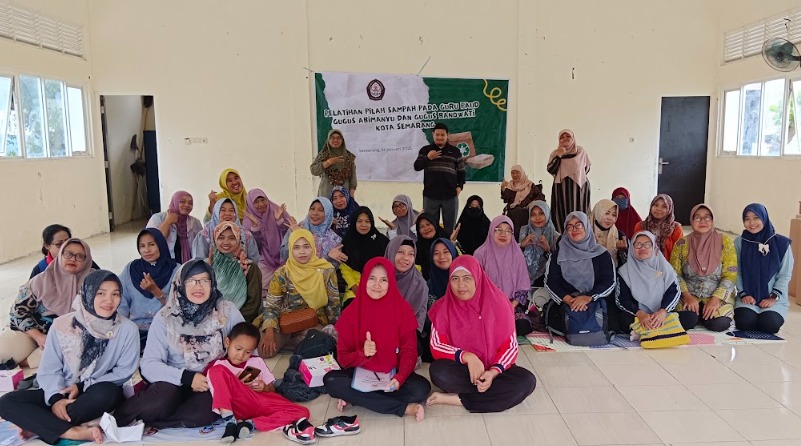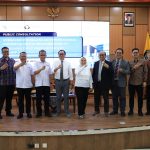Semarang, January 24, 2025 – Five lecturers from the Economics Study Program, Faculty of Economics and Business, Diponegoro University (FEB Undip) held a community service activity by providing waste sorting training to kindergarten teachers who are members of the Abimanyu Group and Banowati Group. This activity was led by Dr. Hastarini Dwi Atmanti, S.E., M.Sc., as a form of implementation of the Tri Dharma of Higher Education, especially in terms of community service.
The implementation of this activity uses the Community Based Participatory Research (CBPR) method, which involves collaboration between researchers and teachers in teaching the concept of waste sorting to students. Waste sorting is the first step in managing waste wisely and sustainably. Therefore, this training aims to instill the habit of sorting waste from an early age so that it becomes part of the community’s culture.
One of the training activity sessions
The implementation of this community service activity was carried out by involving two partners, namely PAUD Schools that are members of the Abimanyu Cluster and the Banowati Cluster. The Abimanyu Cluster consists of 7 (seven) schools, namely Sendangmulyo Kindergarten, Widyatama Kindergarten, Islamadina Kindergarten, Tri Siwi Kindergarten, Belia Puraya Kindergarten, Wijayakusuma Kindergarten and Ananda Kindergarten. The Banowati Cluster consists of 9 (nine) schools, namely Nurussunah Islamic Kindergarten, Mutiara Hikmah Kindergarten, Griyaasik TPA, Bunga Matahari Kindergarten, Nurul Hidayah Kindergarten, Bunga Kindergarten, Anak Bangsa IX Kindergarten, Mekar Ceria Kindergarten, Khodijah 02 Kindergarten. Each school is represented by 2 teachers, so that the number of training participants is 32 people.
Providing trash bins to Abimanyu Group
The majority of teachers who attended the training admitted that they had never taught their students how to sort waste. Therefore, in this training, teachers were given an understanding of how to sort waste using green, yellow, and red bins. Green is for organic waste, yellow for inorganic waste that can be recycled, and red for hazardous waste or toxic materials.
Providing trash bins to Gugus Banowati
This training provides great benefits for teachers, especially in building awareness of the importance of sorting waste. In addition to having an impact on environmental cleanliness, this concept also teaches children the values of discipline from an early age. By understanding how to sort waste properly, children are expected to care more about their environment and health. This community service activity received a positive response from participating teachers. They hope that similar activities can continue so that more educators have insight into implementing the concept of sorting waste in schools. Thus, the younger generation can grow with a high awareness of environmental cleanliness and sustainability.









